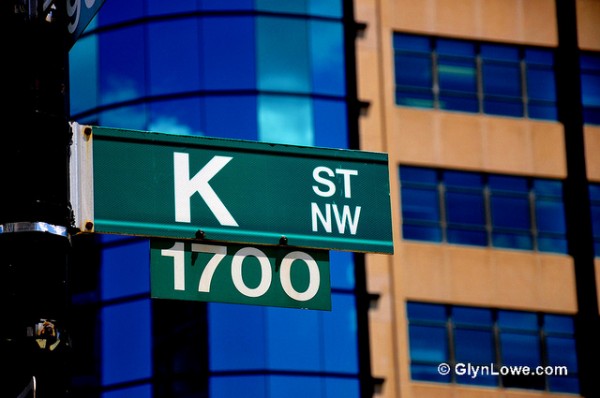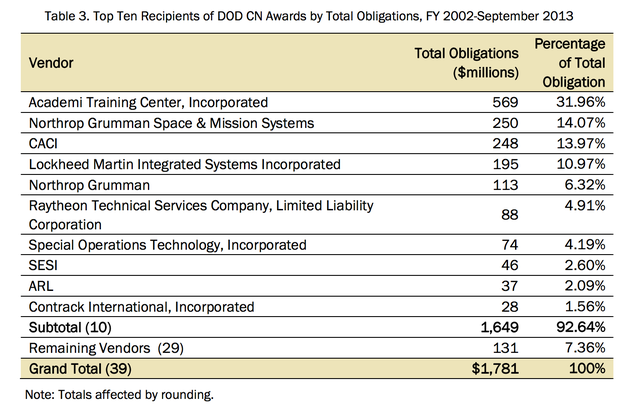The nation’s largest bank is operating under a deferred prosecution agreement until at least next January for two felony counts it received in the Madoff swindle, the largest Ponzi scheme in history. It’s under a current criminal investigation over potential rigging of the foreign exchange markets with the New York Times reporting on February 10 that federal prosecutors had informed JPMorgan and three other banks “that they must enter guilty pleas to settle the cases.” Barron’s sister publication, the Wall Street Journal, reported on February 24 that JPMorgan is one of the 10 banks being investigated by the U.S. Justice Department for potential rigging of gold and other precious metals.
Against that backdrop, Barron’s comes up with this: JPMorgan is “Back on Top.” Back on top of what – its serial crime spree? The article, by Associate Editor Andrew Bary, goes downhill from there.
We don't need no education.
Unless you'd actually prefer to find out what's being covered up by those touting Jamie Dimon and JPMorgan Chase as "back on top!"
5 Truly Crazy Assertions in the Jamie Dimon Cover Story in Barron’s
By Pam Martens and Russ Martens
April 1, 2015
Barron’s should have published its gushing cover story on Jamie Dimon’s stewardship of JPMorgan today – as an April Fool’s joke.
The nation’s largest bank is operating under a deferred prosecution agreement until at least next January for two felony counts it received in the Madoff swindle, the largest Ponzi scheme in history. It’s under a current criminal investigation over potential rigging of the foreign exchange markets with the New York Times reporting on February 10 that federal prosecutors had informed JPMorgan and three other banks “that they must enter guilty pleas to settle the cases.” Barron’s sister publication, the Wall Street Journal, reported on February 24 that JPMorgan is one of the 10 banks being investigated by the U.S. Justice Department for potential rigging of gold and other precious metals.
Against that backdrop, Barron’s comes up with this: JPMorgan is “Back on Top.” Back on top of what – its serial crime spree? The article, by Associate Editor Andrew Bary, goes downhill from there. Here’s a few howlers.
Jamie Dimon, Chairman and CEO of JPMorgan, who has kept his job through a rising tide of scandals at the bank, says in the article: “We were tried, tested, and true during the worst of times.” Compare that assessment to the findings of former Senator Carl Levin in 2013 after his Permanent Subcommittee on Investigations released a 306-page report on how JPMorgan had gambled with bank deposits in the infamous London Whale scandal at the bank and eventually lost at least $6.2 billion of those deposits. Levin said at the time that JPMorgan “piled on risk, hid losses, disregarded risk limits, manipulated risk models, dodged oversight, and misinformed the public.”
Bary quotes Dimon from a January call with analysts as stating that banks are “‘under assault’” from regulators, with Dimon adding that “ ‘We have five or six regulators or people coming after us on every different issue. It’s a hard thing to deal with.’ ” Shouldn’t the debate be why, after a nonstop 5-year crime spree, the nation’s largest bank still is being chased by regulators?
Another howler is Dimon telling the Barron’s reporter that the bank doesn’t take big trading positions and thus it is unfair for some investors to view JPMorgan as a black box, too complex to understand.
Last November, JPMorgan and other Wall Street banks again came under the cross-hairs of the U.S. Senate’s Permanent Subcommittee on Investigations. The Subcommittee released an eye-popping 396-page report on the physical commodity holdings of key Wall Street banks. The investigation found almost unfathomable giant positions at JPMorgan, reporting as follows:
“When the financial holding company’s physical commodities inventory of $6.6 billion is added to the bank’s metals inventory of approximately $8.1 billion – still excluding gold, silver, and all merchant banking commodity assets – and the bank’s copper, platinum, and palladium inventories of $2.7 billion are added in as well, the total market value of JPMorgan’s combined physical commodity inventories on September 28, 2012, was $17.4 billion. That $17.4 billion was about 11.75% of the financial holding company’s Tier 1 capital of $148 billion, which meant that it was more than twice the size allowed by the Federal Reserve’s 5% limit, were it to apply…
“In 2011 (the last complete year of figures provided to the Subcommittee), those inventories included, at various times, as much as 3.3 million metric tons of aluminum (an amount which is more than half of U.S. aluminum consumption that year), 200,000 metric tons of copper, 100,000 metric tons of lead, 6.4 million barrels of crude oil, 3.6 million barrels of heating oil, 900,000 barrels of gasoline, 3.4 million barrels of jet kerosene, and 51.9 billion cubic feet of natural gas. In addition, JPMorgan reported owning or controlling tolling agreements at 31 power plants…
“JPMorgan Chase Bank is the only national bank that, in recent years, has engaged in extensive physical metals trading and maintained a large physical metals inventory…
Elsewhere, Bary writes in the article:
“The bank maintains that one scary figure — some $63 trillion in notional derivatives exposure — vastly overstates the risk because of offsetting positions and other factors. It puts the credit risk of those positions at about $59 billion, and almost 90% of that is exposure to high-grade companies.”
On February 12, the Office of Financial Research (OFR), a unit of the U.S. Treasury Department that was created under the Dodd-Frank financial reform legislation, released a study of the banks that posed the greatest systemic risk to the global financial system. Using systemic risk scores that evaluated size, interconnectedness, substitutability, complexity, and cross-jurisdictional activities, JPMorgan came in with the scariest score of 5.05 for U.S. mega banks. That compares with 4.27 for Citigroup; 3.06 for Bank of America; 2.60 for Morgan Stanley; 2.48 for Goldman Sachs; and 1.72 for Wells Fargo.
The OFR report found further that “A bank that has large foreign assets and large intrafinancial system liabilities is a potential source of spillover risk. If a large loss in value in foreign assets caused such an institution to fail, the losses could be transmitted to the rest of the U.S. financial system.” Both Citigroup and JPMorgan were listed as having the largest figures among U.S. banks for both foreign assets and intrafinancial system liabilities.
One of the gushiest moments in the article comes with Bary writing that “The outspoken Dimon can also come across as the smartest guy in the room, ruffling regulators and politicians. He brings experience, passion, strategic vision, and a familiarity with minute details of the bank’s vast operations.”
Dimon’s familiarity “with minute details” of JPMorgan’s “vast operations” were nowhere to be found when he told analysts in 2012 that the rumors of wild derivative trades at JPMorgan’s London offices were a “tempest in a teapot.” The tempest in a teapot turned out to be at least $6.2 billion in losses of depositor funds. Dimon was also missing in action as JPMorgan served as the primary business checking account for Bernard Madoff’s massive Ponzi scheme.
Dimon’s failure to rein in the serial abuses at JPMorgan has led two attorneys, Helen Davis Chaitman and Lance Gotthoffer, to create a Wheel of Fortune showcasing the mind-numbing crimes that regulators have charged against JPMorgan while offering an on-line book that maps out the underlying culture at the firm. Laurence Kotlikoff of Forbes insightfully says this about the book: “The authors’ description of the difference between Jamie Dimon’s view of himself and reality is the best thing since Jonathan Swift.”
We highly recommend the book to Barron’s Andrew Bary.
Did JPMorgan Try to Bribe Dem Power-Brokers? (Depends What Your Definition of 'Bribe' Is)
Ari Rabin-Havt
March 30, 2015
Did one of the largest banks in the United States accidentally acknowledge an attempt to bribe members of Congress?
A widely published Reuters story reported that four major U.S. banks have threatened to withhold expected campaign contributions from the Democratic Senatorial Campaign Committee unless “Democrats, including [Massachusetts Senator Elizabeth] Warren and Ohio Senator Sherrod Brown ... soften their party's tone toward Wall Street.”
But the article specifically notes: “JPMorgan representatives have met Democratic Party officials to emphasize the connection between its annual contribution and the need for a friendlier attitude toward the banks, a source familiar with JPMorgan's donations said. In past years, the bank has given its donation in one lump sum but this year has so far donated only a third of the amount, the source said.”
A person familiar with JPMorgan's donations—who may or may not be a JPMorgan representative—told a Reuters reporter that JPM told party officials: Be more friendly to banks if you want us to give you the remaining two-thirds of the contributions you were expecting from us.
Even shorter: We are offering you a specific sum of money for specific action—which may simply amount to mouth-shutting and smiling—from members of the Senate.
18 U.S.C. § 201 is extremely clear on the legal definition of bribery:
(b Whoever —Specifically an official act includes:
(1) directly or indirectly, corruptly gives, offers or promises anything of value to any public official or person who has been selected to be a public official, or offers or promises any public official or any person who has been selected to be a public official to give anything of value to any other person or entity, with intent—
(A) to influence any official act;
(3) the term “official act” means any decision or action on any question, matter, cause, suit, proceeding or controversy, which may at any time be pending, or which may by law be brought before any public official, in such official’s official capacity, or in such official’s place of trust or profit.Will JPMorgan face any investigation, let alone penalty, for their attempted bribe? It would be naïve to think so. Yet the only defense for this sort of corruption seems to be that it happens all the time.
Our media and political culture have limited the definition of corruption to gifts of Rolex watches, bundles of cash in the freezer, or falsely reporting mileage expenses. While obviously those committing these offenses should be held accountable, the banks' action here is far more damaging in the long term to our politics because its acceptance ensures their success in manipulating the public policy process.
The banks' confidence in their ability to get away with something that smells like bribery is such that they appear to have telegraphed their quid pro quo offer to a major wire service. But even that understates how broken our system has become. Washington pundits are preoccupied with the question of whether the banks' threat to withhold contributions will impact the pending presidential campaign of Hillary Clinton. No one seems to wonder whether it's a problem if the banks, as they appear to, have bought the system.
Our system has become so broken that those participating in it can ignore corruption when it is staring them right in the face. Or worse, they are just waiting to profit from it themselves.
A Quiet Corporate Coup on Capitol Hill
Instead of lobbying congressional staff, lobbyists are now becoming the staff.
By Jim Hightower
Being a Congress critter isn’t the cushy job many people assume. After all, they must draft laws, organize hearings, write speeches, round up votes, and do all sorts of other things.
Oh, wait … my mistake. Members have staff to do all that, including telling the esteemed legislators how to vote.
Few people realize that congressional staffers have gained far-reaching control over legislation. While the mass media has ignored this power shift, which further removes the people from the making of our laws, corporate lobbyists have long understood it and assiduously wooed staff members with flattery and gifts.
But then it dawned on lobbyists that instead of wooing staff, they should simply become the staff. So when Republicans took charge of the Senate in January, K Street lobbyists moved right into the Capitol Hill offices of the new corporate-hugging majority.
Glyn Lowe Photoworks./Flickr
What a sight to see Tom Chapman, a former top lobbyist for US Airways, now sitting atop the legal staff of the Senate aviation panel that oversees — guess who? — US Airways.
And there’s Joel Leftwich, who pushed furiously to water down nutrition standards for school lunches as a senior lobbyist for Pepsico. Now he can do it directly as the new staff director for the Senate Agriculture Committee, which will re-write the school lunch funding law this year.
What a coincidence.
How about mega-lobbyist Mark Isakowitz, whose specialty is punching loopholes in the Wall Street reform law? As new chief of staff for Senator Rob Portman, Mark is now punching from the inside. And he’s already slipped a special regulatory exemption into law on behalf of big derivative traders like GE and the Koch brothers.
If you voted Republican last fall, is this the change you wanted?





































No comments:
Post a Comment